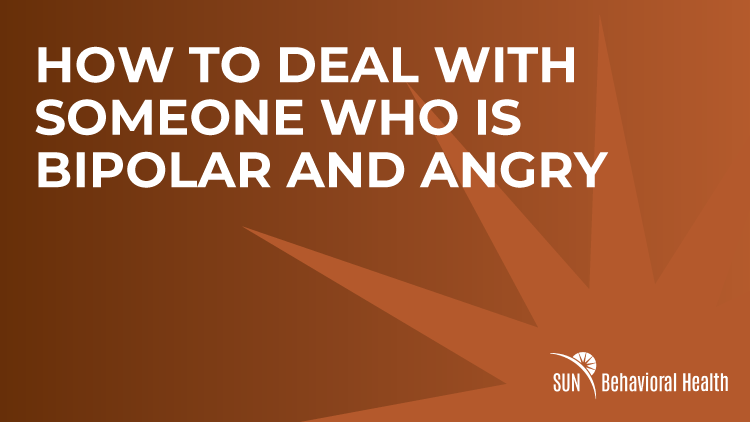Services
- Home
- Mental Health Services
- Who We Treat
- How We Treat
- Patients & Visitors
- About
close

Have you ever woken up in a good mood, your day going smooth and out of nowhere a switch flips and you are mad at the world? Or maybe you and your girlfriend are having a relaxing evening and out of nowhere she starts becoming angry with you and you are not sure why. Mood swings can occur for many reasons, but for those with bipolar disorder, the frequency and intensity of these can affect everyday life.
In Texas, over 3 million adults are living with a mental illness. On top of that, 61% of the adults who need mental health treatment aren’t receiving it. SUN Behavioral Health Houston is here to bridge the gap by providing services for mental health conditions such as bipolar disorder.
Bipolar disorder is a mental health condition that causes shifts in mood, energy levels, and concentration. Previously known as manic-depressive disorder, bipolar disorder is usually described as feelings of intense highs and lows. There are four types of bipolar disorder.
There are some cases of people having bipolar symptoms that do not necessarily meet the criteria for bipolar I or II. This is referred to as bipolar disorder “unspecified” or “other specified.”
Some people experience these episodes over time while others only have a few in their lives. In some cases with bipolar I disorder, shifting between mania and depression can happen quickly, known as “rapid cycling”.
While in a manic state, people with bipolar disorder can have clouded judgment. Feelings and moods are intensified and irritability can turn to anger very quickly. Behaviors get more impulsive and reckless and the person cannot control these feelings. Some signs of mania include:
During these bouts of mania, psychotic symptoms such as hallucinations are possible. These can increase feelings of anger and suicidal ideation.
Even in depressive episodes, anger can still be a challenge. People in depressive episodes feel guilty about not accomplishing tasks and have a negative self-image, leading to bouts of anger and helplessness. Signs of a depressive episode include:
Bipolar disorder can affect your health negatively the longer it goes untreated. Reckless behavior such as engaging in unprotected sex increases the risks of STDs. Heavy drinking and drug use can be harmful to the brain and body, and it can also lead to addiction. Some people have trouble with regular eating habits, either eating too much or not enough during manic and depressive episodes, leading to harmful weight loss or gain.
Bipolar anger can be managed with therapy and medication. A common treatment for bipolar disorder is a mood stabilizer medication, which work to provide relief from long-lasting manic or depressive episodes. Antipsychotic medications are also an effective treatment in keeping mood swings and episodes in check.
Cognitive behavioral therapy (CBT) is an effective bipolar disorder management technique. This type of therapy specifically works to identify harmful behavioral patterns and intrusive thoughts and limits the impact they have on a person’s life. Bipolar disorder is a behavioral mental condition, and CBT targets negative patterns in order to reduce the frequency of impulsive decisions.
There are coping mechanisms you can add to your routine to help reduce the risk of manic or depressive episodes such as:
Bipolar disorder takes away the control the person has over their mood and emotions. While in an episode, whether manic or depressive, it is key to provide support throughout the process.
Seeking treatment for you or someone you love with bipolar disorder does not have to be difficult. At SUN Behavioral Health Houston, our bipolar treatment program uses therapy and medication to make this lifelong disorder manageable.
Our staff at SUN Houston understands that mental health conditions such as bipolar disorder do not always present the same. Medications often take time in order to find which ones are most effective for our patients. We work with each patient on an individual level and continue to provide support and care every step of the way.
Living with bipolar disorder can feel overwhelming. SUN Behavioral Health Houston is here to provide effective treatment to help you improve your quality of life. Call us today at 713-796-2273.
Bipolar disorder affects mood by causing episodes of mania and depression. These episodes can produce mood swings ranging from intense energy and irritability to feeling slow and down.
Bipolar rage can be described as a bout of erratic and uncontrollable anger for no apparent reason. Those who have bipolar disorder cannot control their feelings in manic states.
Bipolar rage and anger can be managed with medication and therapy, as well as a healthy diet, exercise, and a consistent routine.